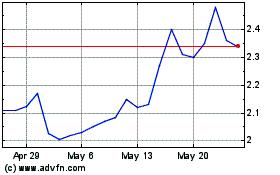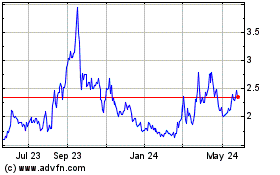Indaptus Therapeutics Presents Encouraging Interim Safety Data from Phase 1 Clinical Trial of Decoy20 at the Society for Immunotherapy of Cancer (SITC) 2024 Annual Meeting
08 November 2024 - 12:00AM

Indaptus Therapeutics, Inc. (Nasdaq: INDP) (“Indaptus” or the
“Company”), a clinical stage biotechnology company dedicated to
pioneering innovative cancer and viral infection treatments,
announces compelling safety, pharmacokinetics, and biomarker data
on its lead compound, Decoy20, at the Society for Immunotherapy of
Cancer (SITC) 2024 annual meeting. The data derive from two cohorts
(13 patients) of Decoy20 single administration and one cohort (6
patients) of Decoy20 weekly administration in the Company’s ongoing
Phase 1 clinical trial. The SITC conference is being held November
6-10, 2024 in Houston, Tex.
The data presented demonstrated that Decoy20
administered intravenously once weekly mainly showed side effects
that were classified as mild or moderate and transient in duration.
Further, pharmacokinetic analysis confirmed that Decoy20 quickly
disappeared from the bloodstream after administration, supporting
the Company’s “pulse” approach. One patient in the trial who has
squamous cell carcinoma of the head and neck (SCCHN) with high
levels of PD-L1, which is a protein that is associated with tumor
response to certain immunotherapies, had “stable disease” — meaning
the cancer had not progressed or worsened — at the time of their
first imaging scan.
“We continue to be encouraged by the safety
profile of Decoy20 when administered weekly,” said Dr. Roger
Waltzman, Chief Medical Officer. “In addition, we see a broad
innate and adaptive immune response. Based upon pre-clinical data,
we expect Decoy20 combined with a PD-1 inhibitor to work together
effectively to control tumors.”
Jeffrey Meckler, Chief Executive Officer,
commented, “We’re pleased to present our latest clinical data at
SITC because it further validates our hypotheses in this Phase 1
trial. We continue to confirm our “pulse-prime” approach, while
observing an acceptable safety profile. Our trial is now enrolling
patients with 6 tumor types for weekly dosing. Furthermore, we
recently announced that we have engaged with BeiGene to embark on a
new cohort where we will combine Decoy20 with BeiGene’s PD-1
inhibitor, tislelizumab. We have great confidence in our Decoy
platform's potential and are excited to continue sharing positive
results and pursuing new opportunities.”
About Indaptus Therapeutics
Indaptus Therapeutics has evolved from more than
a century of immunotherapy advances. The Company’s novel approach
is based on the hypothesis that efficient activation of both innate
and adaptive immune cells and pathways and associated anti-tumor
and anti-viral immune responses will require a multi-targeted
package of immune system-activating signals that can be
administered safely intravenously (i.v.). Indaptus’ patented
technology is composed of single strains of attenuated and killed,
non-pathogenic, Gram-negative bacteria producing a multiple
Toll-like receptor (TLR), Nucleotide oligomerization domain
(NOD)-like receptor (NLR) and Stimulator of interferon genes
(STING) agonist Decoy platform. The product candidates are designed
to have reduced i.v. toxicity, but largely uncompromised ability to
prime or activate many of the cells and pathways of innate and
adaptive immunity. Decoy product candidates represent an
antigen-agnostic technology that have produced single-agent
activity against metastatic pancreatic and orthotopic colorectal
carcinomas, single agent eradication of established
antigen-expressing breast carcinoma, as well as
combination-mediated eradication of established hepatocellular
carcinomas, pancreatic and non-Hodgkin’s lymphomas in standard
pre-clinical models, including syngeneic mouse tumors and human
tumor xenografts. In pre-clinical studies tumor eradication was
observed with Decoy product candidates in combination with
anti-PD-1 checkpoint therapy, low-dose chemotherapy, a
non-steroidal anti-inflammatory drug, or an approved, targeted
antibody. Combination-based tumor eradication in pre-clinical
models produced innate and adaptive immunological memory, involved
activation of both innate and adaptive immune cells, and was
associated with induction of innate and adaptive immune pathways in
tumors after only one i.v. dose of Decoy product candidate, with
associated “cold” to “hot” tumor inflammation signature transition.
IND-enabling, nonclinical toxicology studies demonstrated i.v.
administration without sustained induction of hallmark biomarkers
of cytokine release syndromes, possibly due to passive targeting to
liver, spleen, and tumor, followed by rapid elimination of the
product candidate. Indaptus’ Decoy product candidates have also
produced meaningful single agent activity against chronic hepatitis
B virus (HBV) and chronic human immunodeficiency virus (HIV)
infections in pre-clinical models.
Forward-Looking Statements
This press release contains forward-looking
statements within the meaning of the Private Securities Litigation
Reform Act. These include statements regarding management’s
expectations, beliefs and intentions regarding, among other things:
our expectations and plans regarding our clinical supply agreement
with BeiGene; our plans to advance clinical evaluation of the
combination of BeiGene's anti-PD-1 antibody, tislelizumab, with
Decoy20; our plans to seek FDA approval and to initiate a
combination trial; the anticipated effects of our product
candidates, including Decoy20; the plans and objectives of
management for future operations; our research and development
activities and costs; the sufficiency of our cash and cash
equivalents to fund our ongoing activities and our cash management
strategy; and our assessment of financing options to support our
corporate strategy. Forward-looking statements can be identified by
the use of forward-looking words such as “believe”, “expect”,
“intend”, “plan”, “may”, “should”, “could”, “might”, “seek”,
“target”, “will”, “project”, “forecast”, “continue” or “anticipate”
or their negatives or variations of these words or other comparable
words or by the fact that these statements do not relate strictly
to historical matters. Because forward-looking statements relate to
matters that have not yet occurred, these statements are inherently
subject to risks and uncertainties that could cause our actual
results to differ materially from any future results expressed or
implied by the forward-looking statements. Many factors could cause
actual activities or results to differ materially from the
activities and results anticipated in forward-looking statements,
including, but not limited to the following: our limited operating
history; conditions and events that raise substantial doubt
regarding our ability to continue as going concern; the need for,
and our ability to raise, additional capital given our lack of
current cash flow; our clinical and preclinical development, which
involves a lengthy and expensive process with an uncertain outcome;
our incurrence of significant research and development expenses and
other operating expenses, which may make it difficult for us to
attain profitability; our pursuit of a limited number of research
programs, product candidates and specific indications and failure
to capitalize on product candidates or indications that may be more
profitable or have a greater likelihood of success; our ability to
obtain and maintain regulatory approval of any product candidate;
the market acceptance of our product candidates; our reliance on
third parties to conduct our preclinical studies and clinical
trials and perform other tasks; our reliance on third parties for
the manufacture of our product candidates during clinical
development; our ability to successfully commercialize Decoy20 or
any future product candidates; our ability to obtain or maintain
coverage and adequate reimbursement for our products; the impact of
legislation and healthcare reform measures on our ability to obtain
marketing approval for and commercialize Decoy20 and any future
product candidates; product candidates of our competitors that may
be approved faster, marketed more effectively, and better tolerated
than our product candidates; our ability to adequately protect our
proprietary or licensed technology in the marketplace; the impact
of, and costs of complying with healthcare laws and regulations,
and our failure to comply with such laws and regulations;
information technology system failures, cyberattacks or
deficiencies in our cybersecurity; and unfavorable global economic
conditions. These and other important factors discussed under the
caption “Risk Factors” included in our Quarterly Report on Form
10-Q for the quarter ended June 30, 2024 filed with the SEC on
August 12, 2024, our most recent Annual Report on Form 10-K filed
with the SEC on March 13, 2024, and our other filings with the SEC,
could cause actual results to differ materially from those
indicated by the forward-looking statements made in this press
release. All forward-looking statements speak only as of the date
of this press release and are expressly qualified in their entirety
by the cautionary statements included in this press release. We
undertake no obligation to update or revise forward-looking
statements to reflect events or circumstances that arise after the
date made or to reflect the occurrence of unanticipated events,
except as required by applicable law.
Contact: investors@indaptusrx.com
Investor Relations Contact:CORE IRLouie
Tomalouie@coreir.com
Media Contact:Cuttlefish CommunicationsShira
Derasmoshira@cuttlefishpr.com917-280-2497
Indaptus Therapeutics (NASDAQ:INDP)
Historical Stock Chart
From Dec 2024 to Jan 2025

Indaptus Therapeutics (NASDAQ:INDP)
Historical Stock Chart
From Jan 2024 to Jan 2025
